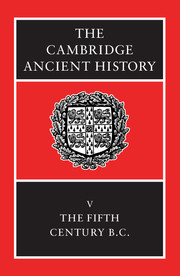Book contents
- Frontmatter
- Contents
- List of maps
- List of text-figures
- Preface
- 1 Sources, chronology, method
- 2 Greece after the Persian Wars
- 3 The Delian League to 449 b. c.
- 4 The Athenian revolution
- 5 Mainland Greece, 479–451 b. c.
- 6 The Thirty Years' Peace
- 7 Sicily, 478-431 b.c.
- 8 Greek culture, religion and society in the fifth century b.c.
- 8a Art: Archaic to Classical
- 8b Classical Cities and Sanctuaries
- 8c Rebuilding in Athens and Attica
- 8d Panhellenic Cults and Panhellenic Poets
- 8e Athenian Cults and Festivals
- 8f Athenian Religion and Literature
- 8g Society and Economy
- 8h Athens as a Cultural Centre
- 9 The Archidamian War
- 10 The Peace of Nicias and the Sicilian Expedition
- 11 The Spartan Resurgence
- Chronological Notes
- Chronological Table
- BIBLIOGRAPHY
- Index
- 1 Greece and Western Asia Minor
- References
8h - Athens as a Cultural Centre
from 8 - Greek culture, religion and society in the fifth century b.c.
Published online by Cambridge University Press: 28 March 2008
- Frontmatter
- Contents
- List of maps
- List of text-figures
- Preface
- 1 Sources, chronology, method
- 2 Greece after the Persian Wars
- 3 The Delian League to 449 b. c.
- 4 The Athenian revolution
- 5 Mainland Greece, 479–451 b. c.
- 6 The Thirty Years' Peace
- 7 Sicily, 478-431 b.c.
- 8 Greek culture, religion and society in the fifth century b.c.
- 8a Art: Archaic to Classical
- 8b Classical Cities and Sanctuaries
- 8c Rebuilding in Athens and Attica
- 8d Panhellenic Cults and Panhellenic Poets
- 8e Athenian Cults and Festivals
- 8f Athenian Religion and Literature
- 8g Society and Economy
- 8h Athens as a Cultural Centre
- 9 The Archidamian War
- 10 The Peace of Nicias and the Sicilian Expedition
- 11 The Spartan Resurgence
- Chronological Notes
- Chronological Table
- BIBLIOGRAPHY
- Index
- 1 Greece and Western Asia Minor
- References
Summary
THE ECONOMIC AND SOCIAL BACKGROUND
‘Because of the greatness of our city there is an influx of all things from the entire world, with the result that the enjoyment of goods produced at home is no more familiar to us than the produce of other men’ (Thuc. II.38.2). Pericles could not have spoken these words before the second half of the fifth century. The Persian Wars, and especially the Persian occupation in 480/79 b.c., had destroyed whatever splendour had made Athens attractive to foreigners in the sixth century. The buildings on the Acropolis, including the Old Temple of Athena erected under Pisistratus and the Old Parthenon, a marble structure to which an earlier poros temple may have given way shortly after Marathon, and the vibrant archaic sculptures of kouroi and korai which archaeologists have recovered for us, were no longer visible after the Persian holocaust. With the exception of Simonides of Ceos, who briefly returned to Athens about the time of Marathon, and of Pindar, who is said to have received some training in Athens late in the sixth century and celebrated the Pythian victory won by the Alcmaeonid Megacles shortly after his ostracism in 486 (Pyth. VII), we know of no literary or intellectual figure whose visit is recorded. There was no interruption in the production of tragedy at the City Dionysia, and comedy was added in 486; whether they lured a significant number of foreign visitors to Athens we do not know.
- Type
- Chapter
- Information
- The Cambridge Ancient History , pp. 306 - 369Publisher: Cambridge University PressPrint publication year: 1992
References
- 4
- Cited by

